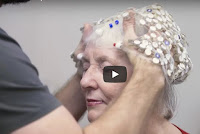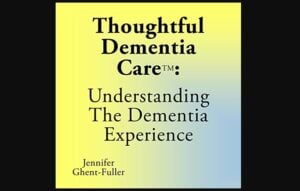NEW VIDEO SEMINAR + ARTICLE:
The University of Sydney Brain and Mind Centre is connecting sleep and dementia to explore treatment and prevention.
Obstructive Sleep Apnoea (OSA) has been linked to brain changes seen in the early stages of dementia, University of Sydney research reveals.
Published in The European Respiratory Journal, the study’s authors say the finding provides evidence that screening older people for obstructive sleep apnoea (OSA) and providing treatment where needed could help prevent dementia in this population.
Obstructive Sleep Apnoea (OSA) is a condition in which the walls of the throat relax and narrow during sleep, which stops breathing and is known to reduce blood oxygen levels. The new study indicates that the decline in blood oxygen levels may be linked to a shrinking of the brain’s temporal lobes and a corresponding decline in memory.
50% of Dementia Risk is Modifiable
Professor Sharon Naismith, University of Sydney
Study leader, Professor Sharon Naismith of the University of Sydney’s Brain and Mind Centre said: “Between 30 and 50 percent of dementia risk is due to modifiable factors, such as depression, high blood pressure, obesity and smoking. In recent years, researchers have recognised that various sleep disturbances are also risk factors for dementia. We wanted to look specifically at obstructive sleep apnoea and its effects on the brain and cognitive abilities.”
The researchers worked with a group of 83 people, aged between 51 and 88 years, who had visited their doctor with concerns over their memory or mood but had no OSA diagnosis. Each participant was assessed for their memory skills and symptoms of depression, and each was given an MRI scan to measure the dimensions of different areas of the brain.
Participants also attended a sleep clinic where they were monitored overnight for signs of OSA using polysomnography. This technique records brain activity, levels of oxygen in the blood, heart rate, breathing and movements.
Low Levels of Oxygen
The researchers found that patients who had low levels of oxygen in their blood while they were sleeping tended to have reduced thickness in the left and right temporal lobes of the brain. These are regions known to be important in memory typically affected in dementia.
These brain changes were also linked with participants’ poorer ability to learn new information. The researchers say this is the first time a direct link of this kind has been shown.
Professor Sharon Naismith, University of Sydney
Conversely, patients with signs of OSA were also more likely to have increased thickness in other regions of the brain, which the researchers say could be signs of the brain reacting to lower levels of oxygen with swelling and inflammation.
It Can Be Treated
OSA is more common in older people and has already been linked with heart disease, stroke and cancer, but it can be treated with a continuous positive airway pressure (CPAP) device, which prevents the airway closing during sleep.
Professor Naismith added: “We chose to study this group because they are older and considered at risk of dementia. Our results suggest that we should be screening for OSA in older people. We should also be asking older patients attending sleep clinics about their memory and thinking skills—and carrying out tests where necessary.
“Treating OSA an Opportunity to Prevent Cognitive Decline”
“There is no cure for dementia so early intervention is key. On the other hand, we do have an effective treatment for OSA. This research shows that diagnosing and treating OSA could be an opportunity to prevent cognitive decline before it’s too late.”
Professor Naismith and her team are now doing research to discover whether CPAP treatment can prevent further cognitive decline and improve brain connectivity in patients with mild cognitive impairment.
See more on sleep and dementia and the services to deal with them at the BRAIN AND MIND CENTRE, with Professor Sharon Naismith at the University of Sydney:
- Professor Sharon Naismith is the Leonard P Ullman Chair in Psychology at the Charles Perkins Centre. She is also an NHMRC Career Development Fellow and Clinical Neuropsychologist who heads the Healthy Brain Ageing Program at the Brain and Mind Centre. Professor Naismith is co-chief investigator of the newly established Australian Dementia Network (ADNet).
SOURCE:












My 78-year old husband was diagnosed with Parkinson’s Disease in April 2018 and Lewy Body Disease, an insidious form of dementia that affects cognition, perception and executive function generally, in March 2021. He had sleep apnoea for many years in his 50s and 60s but didn’t have treatment for it and he also had heart disease from 2006 resulting in a serious episode in 2016 when he had heart failure, off and on for a number of years. I assume all of the above contributed to his Lewy Body Dementia.
My husband was over-weight at times but lost a lot of weight in his 60s and 70s. He didn’t drink alcohol very much and never smoked. He was a Building Surveyor for many years, an intelligent, educated man but this horrible disease has robbed him of so much. Soon after diagnosis of Lewy Body Disease in 2021, he couldn’t find his way from the back of our house to the front and would look for the staircase behind the study door. He received a lot of help in the summer of 2021 and medication which really improved his condition but he is a shadow of the person he was and it’s so sad.
This is an excellent suggestion and matches other research regarding oxygen deprivation or brain damage. (O2 deprivation certainly damages the brain!) However, the test for sleep apnea should come long before "senior age".
Sleep apnea's poster child is an obese, male smoker, who drinks regularly and as other health complications. However, hereditary factors can cause OSA at a much younger age in a very fit person.If your partner snores every night and there is a silence followed by a snort…insist that he or she be tested. The new machines to wear at night are quieter, lighter (can travel) and more adaptable. Pricey, yes, but some extended health carries partial coverage. But cheap compared to the price you pay later, with no treatment.
Probably because men wear their extra weight more often on their chests, they are more prone to OSA but it's a concern for women as well.
If there has been not alcohol, no relaxing substance, or heavy stress, and the trademark snort, insist that he or she be tested. Your doctor can tell you the locations in your area.